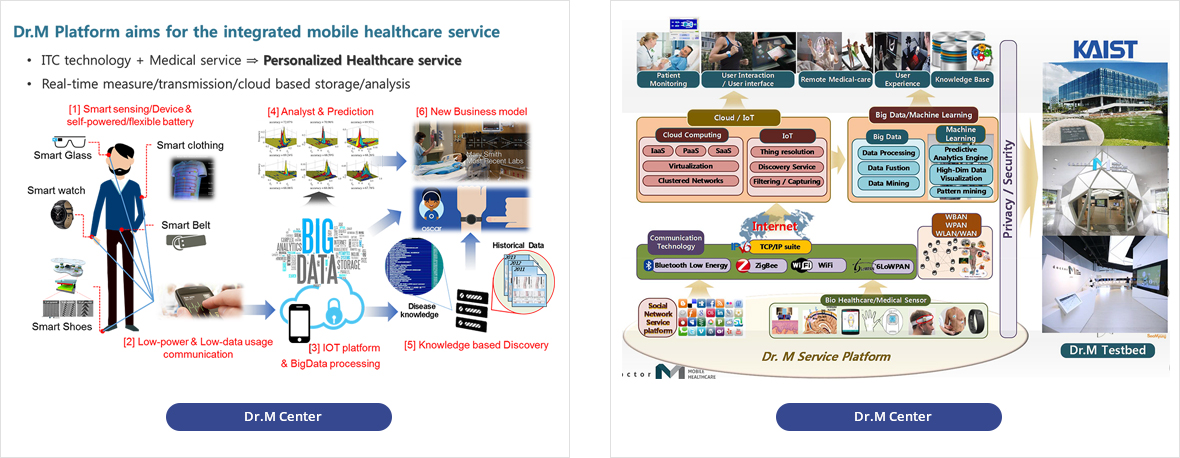
Dr.M Smart Healthcare
With the wide spread of smart phones, the digital age has come and ICT technology is being applied to various fields. In addition, as population aging
becomes a social issue, ICT technology has become widely used in the healthcare field. As a result, the medical paradigm changed from treatment to
prevention and diagnosis. In recent years, various attempts have been made to achieve personal health care for prevention and diagnosis. However, due to
the lack of data for the big-data analysis and a system (or platform) that can manage the measured data, the industry is not yet activated. Korea Advanced
Institute of Science and Technology (KAIST) Dr. M is an innovative “Smart Mobile Healthcare System” which collects and syntagmatically analyzes the user’s
various bio-signals and provides the customized health enhancement service to customers in real-time. To put this system to practical use, numerous new
technologies, such as bio-sensor technology, low-power communication technology, the Internet of Things technology, big data technology, and disease
analysis and prediction technology, need to be developed. To comprehensively develop various technologies like these, KAIST is promoting “Dr. M” project
and, in this regard, recently a large-scaled research test bed is constructed in purpose of testing/evaluating the developed technologies by linking organically.
• Utilization of Dr.M Testbed for Large-Scaled Research
For utilization of testbed, we have distributed 6 types of smart watch/band to 350 members in KAIST from March 2016, collecting the personal health record (heart rate, activity), and GSP information from them. The measured these data from the smart watch/band is transmitted to the smartphone's own application, and the measured data is transmitted to the Dr.M server platform for storage and bigdata processing. Data collection will be conducted for two years. We also extended our large-scaled research to more than 100 elderly people living in Senior Town. We are trying to collect heart rate and activity information through fitbit charge HR, and also usage patterns and GSP information in smartphone for digital phenotype. These data are intended to apply to physical and mental health care services for the elderly
• Digital Phenotyping for Physical, Mental Healthcare and Development of Healthcare Service model
Digital phenotyping is a multidisciplinary field of science, defined as the “moment-by-moment quantification of the individual-level human phenotype in situ using data from personal digital devices,” in particular smartphones. The data can be divided into two subgroups, called active data and passive data, where the former refers to data that requires active input from the users to be generated, whereas passive data, such as sensor data and phone usage patterns, are collected without requiring any active participation from the user. Smartphones are well suited to digital phenotyping given their widespread adoption and ownership, the extent to which users engage with the devices, and richness of data that may be collected from them. Smartphone data can be used to study behavioral patterns, social interactions, physical mobility, gross motor activity, and speech production, among others.
- Mobile Healthcare System
- Wearable Device for Healthcare
- Personal Physical and Mental Health Record & Service
- Digital Phenotype for Healthcare
- Cloud based Big-data Platform



